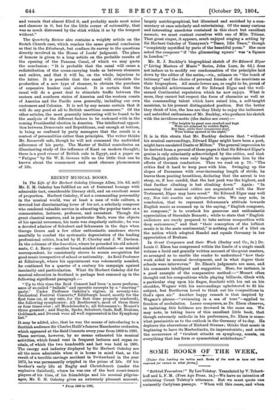Mr. R. J. Buckley's biographical sketch of Sir . 4clavard Elgar
(" Living Masters of Music" Series, John Lane, 2s. 6d.) does not induce us to modify our condemnation of the principles laid down by the editor of the series,—viz., reliance on "the touch of intimacy" and the choice of personal friends of the musicians as their biographers. All music-lovers are, or ought to be, proud of the splendid achievements of Sir Edward Elgar and the well- earned Continental reputation which he now enjoys. What is more, they cannot but respect the force of character as well as the commanding talent which have raised him, a self-taught musician, to his present distinguished position. But the better they think of him, the less are they likely to enjoy the indiscreet and unbridled enthusiasm of Mr. Buckley, who prefaces his sketch with the invidious motto (the italics are ours) :- " The heights by great men reached and kept Were not attained by sudden flight, But they, while their companions slept, Were toiling upward in the night."
It is in this strain that Mr. Buckley declares that "without his musical surroundings, Edward Elgar might have been a poet, might have emulated Dante or Milton." The general impression to be derived from a perusal of these pages is that Sir Edward Elgar's genius is only reluctantly acknowledged by the critics, and that the English public were only taught to appreciate him by the efforts of German conductors. Thus we read on p. 76: "The critics find it hard to keep pace with him. Swinging up the slopes of Parnassus with ever-increasing length of stride, he leaves them panting breathless, declaring that the ascent is too. steep, or, if less candid, that the last peak was the highest, and that farther climbing is but climbing down." Again: "In assuming that musical critics are acquainted with the New Testament, Elgar may have erred." Sir Edward Elgar may well cry, Non tali aurflio nee defensoribus istis. We may note, in conclusion, that to represent Schumann's attitude towards English music as summed up in the saying, " English composer, no composer," is to overlook his generous and enthusiastic appreciation of Sterndale Bennett ; while to state that " English audiences are rarely prepared to take serious composition with deep seriousness," and that "their conception of the loftiest music is in the main sentimental," is nothing short of a libel on the nation which adopted Handel and equals Germany in her appreciation of Brahms.


















































 Previous page
Previous page